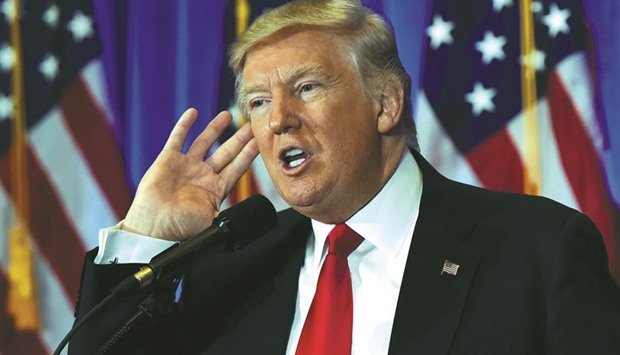US President-elect Donald Trump has shrugged off the strikingly divergent positions his cabinet picks have taken on Russia, torture, and a host of other issues, saying he wanted them to express their own ideas.
“All of my Cabinet nominee (sic) are looking good and doing a great job,” he said in an early morning tweet exactly one week before he takes office. “I want them to be themselves and express their own thoughts, not mine!”
The views of his nominees – on public display in Senate confirmation hearings this week – have often contradicted Trump’s most incendiary pledges made during the presidential campaign.
They have variously warned of the threat posed by Russia, hailed the North Atlantic Treaty Organisation (Nato), repudiated torture, defended the US intelligence community and cautioned against withdrawing from the Iran nuclear treaty and the Paris Climate Accord.
On virtually every controversial foreign policy stance that Trump took during the campaign, the nominees hedged and backtracked and sought to assure senators that they shared the consensus that has shaped Western strategic thinking and institutions since World War II.
The contrast was all the more striking because it came against the backdrop of an ugly feud between Trump and the US intelligence agencies, stoked by the leak of an unsubstantiated report that Russia had gathered compromising personal and financial material on the president-elect.
“Totally made up facts by sleazebag political operatives, both Democrats and Republicans – FAKE NEWS! Russia says nothing exists,” Trump tweeted early yesterday. “Probably ... released by ‘Intelligence’ even knowing there is no proof, and never will be. My people will have a full report on hacking within 90 days!”
In his confirmation hearing on Thursday, Trump’s choice for Central Intelligence Agency (CIA) director, Mike Pompeo, said that while he had observed politicians twist intelligence, he had not seen evidence that the intelligence agencies themselves were politicised.
Asked whether as CIA director he would pursue reports of contacts between Trump and the Russians, Pompeo noted those claims were unsubstantiated but pledged: “I promise I’ll pursue the facts wherever they take us.”
Pompeo also promised he would “absolutely not” comply with any order to revive the “enhanced interrogation techniques” that the CIA used after 9/11 and are widely regarded as torture, crossing out another Trump campaign boast.
Trump, who sees an opportunity to co-operate with Moscow in fighting militant groups like Islamic State, has expressed admiration for Russian President Vladimir Putin, and only reluctantly accepted US intelligence’s conclusion that Russian hackers acting on Putin’s authority interfered in the US elections.
His nominee for defence secretary, retired Marine Corps general James Mattis, however, painted a stark picture of Russian intentions on Thursday.
“Right now, the most important thing is that we recognise the reality of what we deal with with Mr Putin, and we recognise that he is trying to break the North Atlantic alliance,” Mattis said.
Trump the candidate questioned Nato’s relevance, and suggested that Japan and South Korea obtain nuclear weapons – ideas that his choice for secretary of state, former ExxonMobil chief executive Rex Tillerson, differed with.
US commitment to Nato is “inviolable” and Russia poses an international threat, Tillerson assured senators on Wednesday, arguing that its takeover of Crimea and meddling in Ukraine should have been met with “a proportional show of force”.
“Our Nato allies are right to be alarmed at resurgent Russia,” he said.
Trump has vowed to pull out of the 2015 nuclear agreement with Iran that outgoing President Barack Obama has hailed as having stopped Tehran’s march toward an atomic weapons capability.
Mattis, a hawk on Iran, said the treaty was “imperfect”.
“But when America gives her word, we have to live up to it and work with our allies,” he said on Thursday.
Tillerson offered similar sentiments on the Paris Agreement, a global accord on curbing greenhouse gas emissions that Trump vowed to cancel but later said he had an “open mind” about.
“It’s important that the United States maintain its seat at the table with the conversations around how to deal with the threats of climate change,” said Tillerson, acknowledging that global warming is a risk.
Trump’s signature campaign issue – a huge wall on the US border with Mexico – also underwent some finessing in testimony on Thursday by retired general John Kelly, the president-elect’s pick for secretary of homeland defence.
“A physical barrier in and of itself will not do the job,” Kelly said.
Trump’s spokesman Sean Spicer downplayed the divergences between the president-elect and his top nominees on Thursday, saying: “He’s not asking for clones.”
“At the end of the day, each one of them is going to pursue a Trump agenda and a Trump vision,” he told reporters.

Donald Trump
